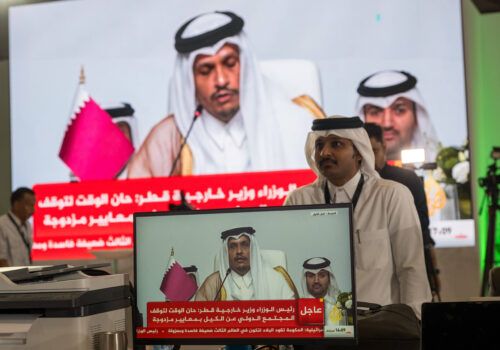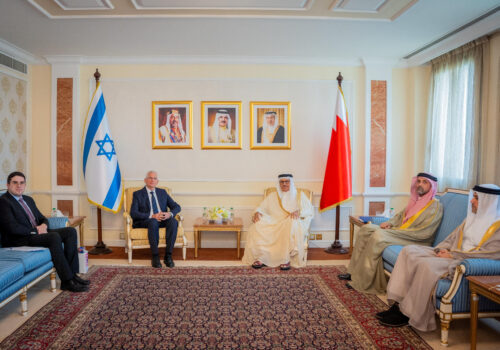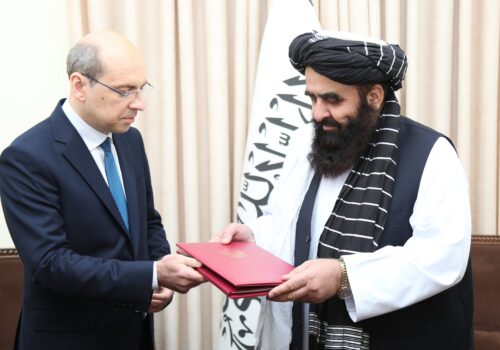How Israel’s strike on Doha is forcing a Gulf security reckoning
Israel’s September 9 military strike on Qatar marks a major escalation in regional tensions and presents Doha with an urgent new security dilemma. For Qatar, the attack raises fears of joining a growing list of Arab states that have been subjected to Israeli military aggression. Although the strike targeted Qatar specifically, the other Gulf Cooperation Council (GCC) members have interpreted it as a broader threat to all of them. In response, the incident is catalyzing greater unity and coordination among the six Gulf monarchies, whose threat perceptions of Israel have reached new heights this month.
This unity was on display when the President of the United Arab Emirates (UAE), Mohammed bin Zayed, arrived in Doha one day after the attack, and Saudi Crown Prince and Prime Minister Mohammed bin Salman condemned Israel’s “brutal aggression” against Qatar and vowed that Riyadh would stand with Doha “without limit.” Such solidarity speaks volumes about how much intra-GCC dynamics have changed since the Emirati and Saudi-led blockade of Qatar, which ended less than five years ago.
Beyond the GCC, leaders and representatives from across the Arab-Islamic world convened in Doha on September 15 for an emergency summit organized by the Arab League and the Organization of Islamic Cooperation. Together, they issued a unified condemnation of Israel’s strike on Qatar. In his address, Emir Sheikh Tamim bin Hamad Al Thani warned of Prime Minister Benjamin Netanyahu’s expansionist ambitions, calling the notion of turning the Arab world into “an Israeli sphere of influence” a “dangerous illusion.”
US security guarantees under scrutiny
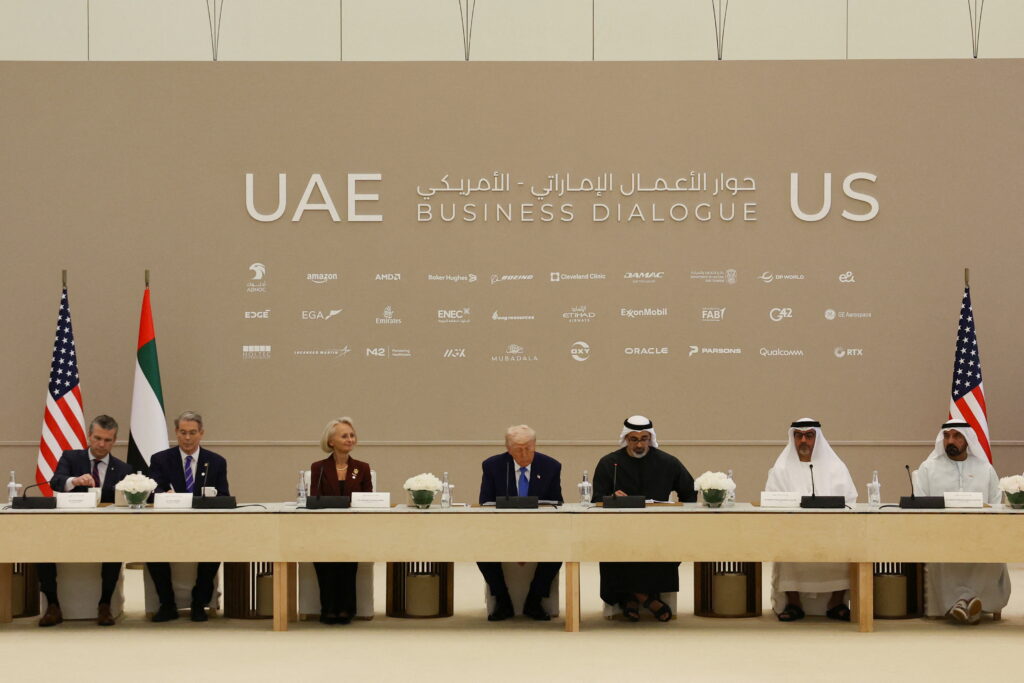
For decades, Gulf governments have depended on the United States as their primary security guarantor, particularly against Iran and Ba’athist Iraq. However, a series of US foreign policy decisions in the twenty-first century—including Washington’s response to the 2010–11 Arab Spring, the 2015 Iran nuclear deal, and its limited reaction to the 2019 attacks on Saudi Aramco and the 2022 Houthi strikes on Abu Dhabi—have, to varying degrees, gradually eroded Gulf states’ confidence in America’s commitment to their security. Israel’s recent military strike on Qatar, however, brought those concerns to the forefront, sharply intensifying doubts among Gulf monarchies about the reliability of the US security umbrella.
As CNN and Axios have reported, US and Israeli officials claim that Netanyahu notified the Trump administration prior to the launch of this operation. If true, this contradicts the White House’s claims that the notification only came after Israel’s military launched the missiles at Doha. Nonetheless, Trump responded to Israel’s bombing of Qatar by referring to the Gulf country as a “great ally” and warned Netanyahu’s government to be “very careful.”
Regardless of the timing and which version of events is accurate, Doha’s key lesson is that the American security umbrella failed to prevent this unprecedented attack from occurring. Given that Qatar has hosted the US Central Command’s forward headquarters at al-Udeid Air Base for over two decades and was designated a Major Non-NATO Ally in 2022, Doha is now questioning what these aspects of its defense partnership with Washington truly mean in practice if Washington permits (or at least fails to prevent) an Israeli strike on Qatari territory.
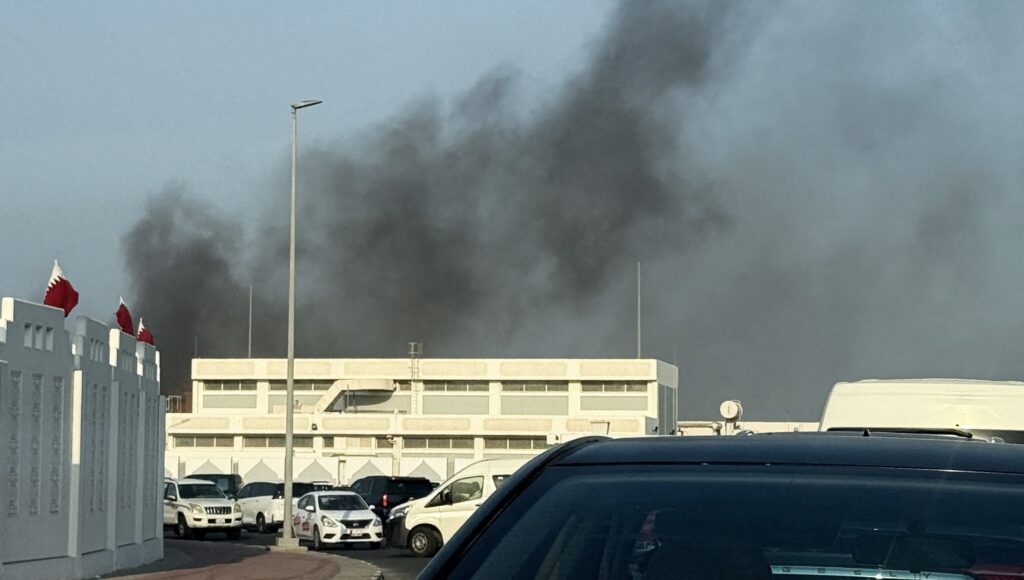
This incident has also prompted similar concerns among other GCC members, who are now asking what protections, if any, they have that Qatar did not. If Israel is willing to carry out such an operation with apparent impunity, what would stop it from targeting individuals deemed “terrorists” by its government elsewhere in the Gulf—such as a Houthi representative based in Muscat?
SIGN UP FOR THIS WEEK IN THE MIDEAST NEWSLETTER
Against the backdrop of Israel’s increasingly assertive regional posture—including its strike on Doha, the June attack on Iran that launched the Twelve Day War, ongoing military operations against the Houthis in Yemen, and frequent airstrikes across Syria since last year’s fall of Bashar al-Assad’s regime—the GCC states are finding themselves more closely aligned in their threat perceptions. As each of the six monarchies pursues ambitious economic development and diversification agendas, regional stability has become a shared strategic imperative. Attracting investors, business leaders, and tourists depends on maintaining a secure environment—not just within their own borders, but across the broader region. From the Gulf’s perspective, Israel’s actions are casting a long shadow over the viability of these visions for economic transformation.
In this context, it was unsurprising that Gulf leaders swiftly condemned Israel’s strike on Qatar and expressed unequivocal solidarity with Doha. For all six monarchies, the imperative is clear: to signal that such acts of aggression must not be normalized or allowed to become a precedent. While Israeli airstrikes in Lebanon, Syria, the Palestinian territories, and Yemen have become routine, Gulf states are united in their determination to prevent any GCC member from being added to that list. There is a growing consensus across the Gulf that Israel must face consequences for its actions to deter any future attacks on Gulf monarchies.
Gulf options
Lacking the military capacity to respond directly to Israel, GCC states are compelled to explore alternative, non-military options. Chief among these is the strategic use of their close relationship with US President Donald Trump and key figures within his administration. Gulf leaders are likely to press Washington to exert its considerable leverage over Israel to prevent any future attacks on a GCC member. Aware of the Trump administration’s reliance on the Gulf monarchies for advancing US economic, geopolitical, and security objectives, these states possess diplomatic and economic levers that could be employed skillfully.
Given the UAE’s status as the Gulf state with the closest ties to Israel, Doha and possibly other GCC capitals are quietly encouraging Abu Dhabi to reassess its relations with Tel Aviv. Although a full abrogation of the Abraham Accords in response to the September 9 Israeli strike on Qatar remains unlikely at this point, Emirati officials may consider recalibrating bilateral ties to convey that aggression against any GCC member carries consequences. Even if short of abrogating the Abraham Accords, Abu Dhabi and Manama could expel ambassadors, downgrade diplomatic relations (as the UAE did with Iran in January 2016), or decrease their public engagement with Israel. Looking ahead, should Israel continue to act with impunity and Washington fail to restrain its behavior, Abu Dhabi could retain its option to withdraw from the Abraham Accords altogether as a form of leverage. Nonetheless, aside from strong rhetoric condemning the attack on Doha, so far the UAE’s only diplomatic action in response to Israel’s bombing of its fellow GCC state has been to summon the deputy Israeli ambassador to Abu Dhabi.
Ultimately, GCC members face an inflection point as they grapple with new regional realities. Israel’s willingness to strike a Gulf state and Washington’s tacit acquiescence have exposed a critical vulnerability in the Gulf’s longstanding reliance on the United States as its principal security guarantor. Should further Israeli attacks occur, Gulf leaders will be confronted with the challenge of managing a growing security threat absent the protective umbrella they have long depended on. With no alternative global or regional power both capable and willing to replace Washington in this role, the Gulf monarchies may be increasingly driven to deepen intra-GCC defense coordination and revive aspirations for a more autonomous, NATO-style security framework. Developing robust missile defense systems and credible deterrent capabilities will require time and sustained investment. Yet, this trajectory appears increasingly necessary.
In parallel, Gulf states are likely to expand strategic partnerships with Pakistan and Turkey. Both of these countries have their own vested interests in preserving Gulf security and sovereignty amid an increasingly assertive Israeli posture and perceived US disengagement. Just eight days after the Israeli attack on Doha, Saudi Arabia and Pakistan signed a defense treaty, which puts the Kingdom under Islamabad’s security umbrella. This is particularly relevant given Pakistan’s increasingly grave concerns about an Israeli-Indian nexus within the context of the armed conflict between Islamabad and New Delhi earlier this year, as well as Turkey’s perception of a growing Israeli threat in Syria.
Iran can be counted on to opportunistically seize this moment to capitalize on its Arab neighbors’ growing distrust of Washington and try to bring Tehran closer to Doha and other GCC capitals. Although it is extremely doubtful that the fallout from this Israeli strike on Qatar will lead to any major GCC-wide pivot toward Iran as a security partner, Tehran will be positioned to gain in mostly symbolic ways while advancing its anti-Israeli rhetoric and narrative of standing with other Muslim-majority nations in opposing Israel.
In sum, while the precise trajectory of GCC responses remains uncertain, Israel’s strike has served as a shock, compelling all six members to re-examine long-standing assumptions about the reliability of their US security guarantor. In its wake, the Gulf monarchies have displayed strong unity at a time when rethinking twenty-first-century Gulf security is no longer optional. Whether through greater intra-GCC coordination, diversification of external partnerships, or renewed efforts toward strategic autonomy, the region now stands at a critical juncture—one that will shape the contours of Gulf security for years to come.
Giorgio Cafiero is the CEO of Gulf State Analytics, a Washington, DC-based geopolitical risk consultancy. He is also an Adjunct Assistant Professor at Georgetown University.
Further reading
Thu, Sep 18, 2025
Are Arab nations going to impose real costs on Israel?
New Atlanticist By Gina Abercrombie-Winstanley
Arab and Islamic leaders recently met in Doha to discuss Israel’s strike against Hamas leaders in the Qatari capital. It might mark a turning point in regional diplomacy toward Israel.
Thu, Sep 18, 2025
Insights from Israel and the Gulf: An evolving regional integration
MENASource By
At a moment when the Abraham Accords is in question, we witnessed how the region moves quietly, sometimes boldly, towards cooperation.
Fri, Aug 1, 2025
Where does the Gulf stand on Russia’s recognition of the Taliban?
MENASource By
While maintaining close ties with the West, the GCC has increasingly strengthened its ties with Russia and China.
Image: Qatar's Foreign Ministry spokesperson Majed al-Ansari speaks at a press conference after the emergency Arab-Islamic summit to discuss the Israeli attack on Qatar in Doha, Qatar, on September 15, 2025. (Photo by Noushad Thekkayil/NurPhoto)NO USE FRANCE
